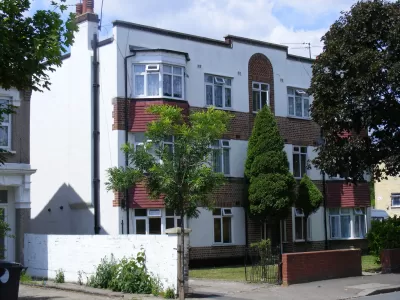Entrepreneur Tyrone Poole's Oregon start-up matches prospective tenants with rental units they qualify for, eliminating legwork and application fees.

A decade ago, Tyrone Poole was homeless. As he struggled to reestablish himself, Laura Bliss writes, "Poole discovered the biggest blockade between him and an apartment was the mysterious web of qualifications that landlords required of him as a renter. Property managers seemed to have no rhyme or reason for whom they'd accept, and he just had to cross his fingers and guess. Every time he applied and failed, it was another $30 or $50 he didn't really have, down the drain."
In 2013, Poole came up with the concept for NoAppFee, "a single-entry online platform that screens hopeful tenants against the exact specifications of vacant units, virtually free of cost." The site launched in beta in 2015, and Poole's team is working with the Portland Housing Bureau to set up a .gov site to connect applicants with affordable housing units.
Poole hopes the platform will be attractive to landlords as well as renters. "Poole says a few [property managers] have been wary of his project—they like having control over who gets into their units—but most are enthusiastic about automating the exhausting process of finding quality tenants, even if it means losing application fees."
The tool has the added benefit of "screening" for housing discrimination: "If applicants match all the criteria, but still don't get accepted by a property manager, that tips off housing officials that another factor could be at play—like race, disability, or religion."
FULL STORY: A Portland Start-Up Is Smashing Barriers to Affordable Housing

Alabama: Trump Terminates Settlements for Black Communities Harmed By Raw Sewage
Trump deemed the landmark civil rights agreement “illegal DEI and environmental justice policy.”

Planetizen Federal Action Tracker
A weekly monitor of how Trump’s orders and actions are impacting planners and planning in America.

The 120 Year Old Tiny Home Villages That Sheltered San Francisco’s Earthquake Refugees
More than a century ago, San Francisco mobilized to house thousands of residents displaced by the 1906 earthquake. Could their strategy offer a model for the present?

In Both Crashes and Crime, Public Transportation is Far Safer than Driving
Contrary to popular assumptions, public transportation has far lower crash and crime rates than automobile travel. For safer communities, improve and encourage transit travel.

Report: Zoning Reforms Should Complement Nashville’s Ambitious Transit Plan
Without reform, restrictive zoning codes will limit the impact of the city’s planned transit expansion and could exclude some of the residents who depend on transit the most.

Judge Orders Release of Frozen IRA, IIJA Funding
The decision is a victory for environmental groups who charged that freezing funds for critical infrastructure and disaster response programs caused “real and irreparable harm” to communities.
Urban Design for Planners 1: Software Tools
This six-course series explores essential urban design concepts using open source software and equips planners with the tools they need to participate fully in the urban design process.
Planning for Universal Design
Learn the tools for implementing Universal Design in planning regulations.
Clanton & Associates, Inc.
Jessamine County Fiscal Court
Institute for Housing and Urban Development Studies (IHS)
City of Grandview
Harvard GSD Executive Education
Toledo-Lucas County Plan Commissions
Salt Lake City
NYU Wagner Graduate School of Public Service





























